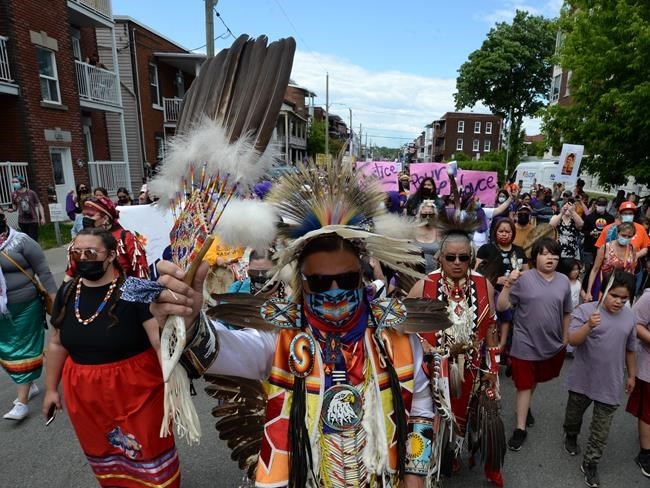MONTREAL — Indigenous leaders in Quebec are lamenting the fact that priorities for their communities have been largely ignored during the provincial election campaign.
Atikamekw Grand Chief Constant Awashish says he's not surprised the campaign has neglected issues such as Indigenous self-determination, use of lands, resource-sharing or nation-to-nation partnerships. Those topics aren't championed by political parties, he said, because leaders don't need the votes of Indigenous Peoples to get elected.
“Of course I want things to change," Awashish said in Montreal this week. "I want to have a better future for my people, a better future for my children, and I think there’s a moral responsibility (among parties)."
The Atikamekw community has been asking for a series of measures — called Joyce's Principle — to be adopted into Quebec law. The principle is a list of recommendations to Quebec and Canadian governments on how to tackle systemic racism in health and social services. It is named after Joyce Echaquan, a 37-year-old Atikamekw mother of seven who died in hospital in Joliette, Que., in 2020, after filming staff using derogatory slurs against her.
The Coalition Avenir Québec government has refused to adopt the principle because document refers to systemic racism in Quebec's institutions, a phenomenon the incumbent government maintains doesn't exist in the province. Meanwhile, CAQ Leader François Legault had to apologize to Echaquan's widower after saying during a televised leaders debate that the racism situation at the hospital in Joliette was "settled.''
Ghislain Picard, chief of the Assembly of First Nations Quebec-Labrador, says the CAQ's stance on systemic racism will return as a topic of debate after the election — as will issues such as resource exploitation and cultural safety.
“These issues won’t go away," Picard said on Friday from the First Nations territory of Pessamit, on Quebec's North Shore.
"Any government wanting to take the lead after the Oct. 3 vote will definitely have these issues at the forefront because I think our people are deeply committed, very determined to see through these issues; so I think it sets the agenda for the next government.”
He said there is a "diversity of views" in First Nations communities regarding the extent to which Indigenous people should participate in provincial elections. There are nine Indigenous candidates running in the current campaign — an all-time high, Picard said.
“A lot of it is the ongoing debate in our nations and communities about taking part in another government’s process; we have a diversity of views just on that alone," Picard said.
“At the same time, people are thinking we need that voice (in the legislature) and this is probably the guiding force.”
Awashish said he would like to see more awareness and understanding of Indigenous communities by Quebec politicians.
“We need more education, we need more awareness, for everybody, but mainly to non-Indigenous elected people, they need to see us differently, they need to know us differently so they can see us as the solution of the future," he said.
Taiaiake Alfred, a Mohawk writer and political strategist from Kahnawake, south of Montreal, said there simply isn't much incentive for political parties to engage with First Nations and Inuit communities during provincial elections. The relationship between settler governments and First Nations should be on another level, he said.
“They’re a nation and we’re a nation; we should relate to them on a collective level as opposed to draw them into our politics and getting involved in their politics," Alfred said.
Whoever is elected politically — be it a nationalist, federalist or separatist government — matters little to people living in the community, he said. “It makes no difference in terms of how the Crown and Quebec identity manifests themselves toward us; it’s never been a factor so we don’t involve ourselves."
Indigenous issues made it into the campaign on Friday — National Truth and Reconciliation Day, a federal statutory holiday. Legault suggested a CAQ government would table a bill on the protection of Indigenous languages.
Earlier, Legault spoke with residential school survivors in the Abitibi-Témiscamingue region, in northwestern Quebec. The premier visited the site of St-Marc-de-Figuery residential school in Amos, Que., which operated between 1955 and 1973. The site was razed, and what remains is a plaque, and next to it are dozens of pairs of children's shoes, a symbol of those children that never came home.
Legault said it is important to recognize the painful truth and to create a relationship with Indigenous Peoples founded "on respect, nation to nation, equal to equal."
Johnny Wylde, a residential school survivor, told Legault during the visit, “We feel ignored." The CAQ leader responded that he would spend more time with First Nations communities should he win the Oct. 3 election.
Édouard Kistabish, another residential school survivor, told reporters, “The parties do not talk about (Indigenous issues) enough, we are forgotten on some level, we just talk about Quebecers."
In Montreal, Liberal Leader Dominque Anglade told reporters that if elected, she would immediately adopt Joyce's Principle in her first 100 days in office. She said that Orange Shirt Day should be a statutory holiday in Quebec, one to reflect on residential schools and to focus on the future.
Legault has refused to make the day an official provincial holiday; he has said Quebecers don't need another day off and that the province needs more "productivity."
This report by The Canadian Press was first published Sept. 30, 2022.
— With files from Patrice Bergeron in St-Marc-de-Figuery, Que.
Sidhartha Banerjee, The Canadian Press



